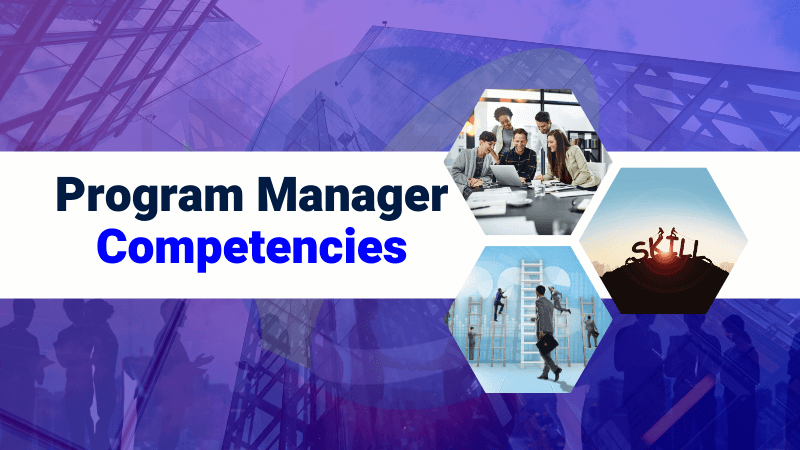
by vCare Project Management CW | Aug 2, 2024 | Program Management
Today’s organizations are structured through many time-limited programs that transform organizational strategy into action. These programs necessitate a visionary mindset to align program goals with the organization’s strategic objectives. While project managers direct project work, they ensure individual projects align with program goals. Thus, program managers see their role as strategic and play an important role in managing the implementation of the organization’s strategic objectives by ensuring that the overall mission is met through the successful completion of planned programs.
Core Competencies of Program Managers
There are many similarities between a good program manager and a good project manager. However, a program manager must have broader organizational knowledge than a project manager. In addition, programs frequently necessitate strategic visioning and planning skills to align overall program goals and benefits with the organization’s long-term goals.
Here are the top ten core competencies of Program Managers:
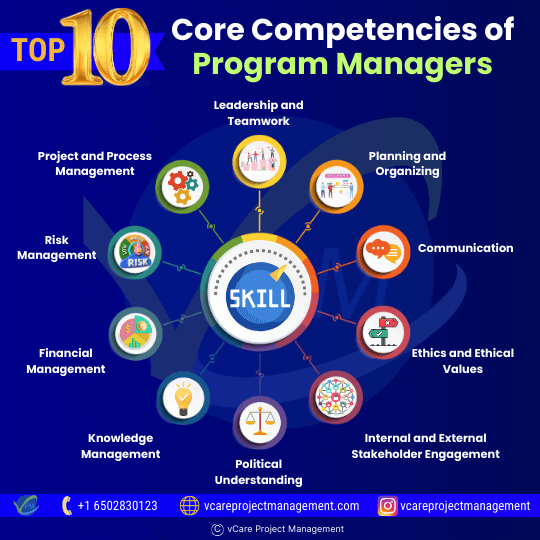
Core Competencies of Program Managers
1. Leadership and Teamwork
The program manager is the team’s leader and is accountable for the program’s overall success. As a result, it is critical to have a clear vision and the ability to communicate it effectively to all employees, whether charismatic, supportive, or inspiring. The program manager’s strong leadership provides direction, builds morale, and inspires the program and project teams.
As the team leader, the program manager is responsible for engaging all team members and fostering collaboration, individual commitment, and accountability. A program manager must decide which tasks can be assigned and who can delegate them. Understanding what to delegate and how to delegate is critical.
2. Planning and Organizing
Programs frequently necessitate strategic visioning and planning skills to align overall program goals and benefits with the organization’s long-term goals. Therefore, the program manager must be skilled at planning and organizing for the best outcomes. Aside from the program schedule, creating a Work Breakdown Structure (WBS) for the program at the summary level is critical. It also allows control accounts to manage cost, schedule, and scope. In addition, a well-designed Work Breakdown Structure (WBS) helps organize the team at the start of a program and makes change management easier.
3. Communication
A program manager must be a good communicator. Effectively moving information between project resources is critical to a program’s success. To ensure the success of the team and project, the program manager must be able to negotiate effectively and use persuasion when necessary.
Thus, effective communication entails breaking down barriers within and across projects and functional departments.
Communication “hard skills” include gathering and disseminating performance data, such as status reports, progress measurements, and forecasts. In addition, the program manager must communicate effectively with the program and project teams, top management, and stakeholders. For the project’s success, vertical and horizontal communication must be fluid and transparent.
4. Ethics and Ethical Values
One of the key aspects of effective program management is ethics.
The Code of Ethics & Professional Conduct emphasizes ethical values such as trust, honesty, accountability, respect, and fairness—these five values foster team harmony and professionalism, which leads to project success. Building trusting relationships across cultures, time zones, teams, and departments aids in the smooth operation of projects.
Trust is the common thread that connects different cultural differences, disparate work cultures spanning multiple time zones, team members with different behaviors, and departments with distinct objectives. A project leader must grasp this and cultivate trustworthy relationships.
Treating people fairly and demonstrating responsible, ethical behavior toward subordinates creates a working environment where employees feel safe, protected, and confident that there is no room for injustice or discrimination.
5. Internal and External Stakeholder Engagement
The program manager must be able to focus on both internal and external stakeholders simultaneously. Identifying and documenting all individuals or organizations impacted by the program and its projects and pertinent information about their interests and involvement significantly impacts program and project success. This process enables dealing with internal stakeholders (other project managers, senior managers, and the like) and external stakeholders (other agencies and regulators).
6. Political Understanding
Another skill that the program manager must have is the ability to understand the organization’s political environment. This understanding includes the political aspects of networking and strategic thinking to make the best decisions. With a solid understanding of the political environment, the program manager must form positive relationships to realize the program’s full benefits when the activities are transitioned to gain leverage and buy-in for overall program success. According to PMI’s The Standard for Program Management, well-managed stakeholder expectations and established buy-in can ensure program success. Knowing the firm’s working dynamic and environment is critical to the program manager’s success.
7. Knowledge management
A successful program manager should have a solid understanding of the organization and its business practices and familiarity with the technologies used in the program’s projects. In addition, program managers must have “hard skills” such as technical expertise and detailed cross-functional knowledge. This knowledge keeps the PM from being unduly influenced by functional experts who either have a plan or make decisions based on limited information.
The program manager is responsible for interpreting, implementing, and reviewing program policies, procedures, and requirements and communicating these to all program team members and project managers.
8. Financial Management
In today’s environment of scarce and competitive resources, program managers must understand how to finance their programs with speed, economy, and efficiency. Program managers are in charge of budgeting and calculating the return on investment (ROI). Therefore, they must be familiar with the program’s financial aspects to keep the budget under control at all times. In addition, they will be required to make decisions that will directly impact the budget and ROI for all projects within the program; therefore, program managers must be knowledgeable about the financial issues involved.
9. Risk management
Program management works tirelessly to reduce business risk. However, a project with no risk has little potential for reward. Effective risk management necessitates identifying risks, assessing their potential for harm, and developing plans to address the threats. Program managers are in charge of gathering all risks from functional teams and leading the team through a risk analysis exercise to determine which risks are program-level and project-level.
The program risks are then classified and prioritized based on their potential impact on the program. Finally, a similar exercise is performed to mitigate project risks throughout the life cycle to reduce overall program risk.
10. Project and Process Management
Transitioning from project management to program management necessitates a greater emphasis on the horizontal domain and less on technical capabilities. This action requires the program manager to prioritize strategic efforts over tactical skills, which can be delegated. Therefore, the program manager must have excellent project and process management skills, ideally with prior project management experience.
Managing program complexity through efficient and effective project management is critical for program management. Program management imposes structure and provides a framework that breaks down the complexity of managing a group of dynamic, time-limited projects into more manageable and cost-effective elements. This framework is critical for planning, scheduling, budgeting, and quality control. In addition, a program manager with strong core project and process management competencies can successfully lead between and across multiple projects.
Leadership Styles for Future Project/Program Managers
One of the potential success factors for both program and project managers is leadership style. A project manager can become a great project leader by understanding leadership styles and their impact. As a result, the program and project managers must determine the best leadership style for each project team. Some of the most common project management leadership styles are:
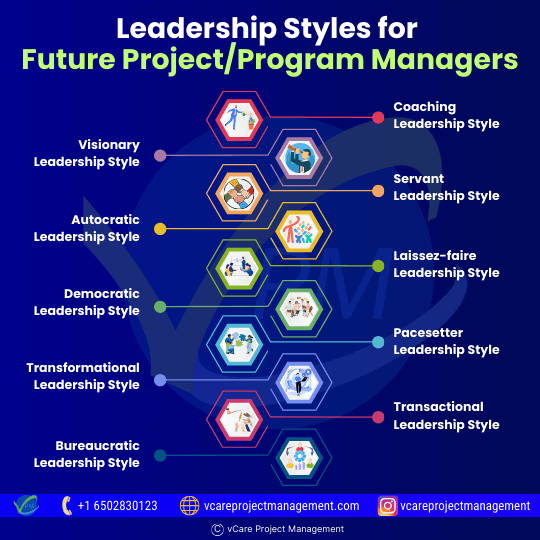
Leadership Styles for Future Project/Program Managers
1. Coaching leadership style
The coach’s leadership style is one of the most advantageous to employers and employees. But unfortunately, because it takes more time than other types of leadership, it is also one of the most underutilized.
2. Visionary leadership style
A visionary leadership style is advantageous for small, rapidly growing, and larger organizations undergoing transformations or corporate restructuring.
3. Servant leadership style
Servant leadership is an excellent leadership style for organizations of any size or industry, but it is especially common in non-profits. These leaders excel at boosting employee morale and reinvigorating employees’ interest in their work.
4. Autocratic leadership style
Autocratic leadership can benefit organizations with strict guidelines or industries that rely heavily on compliance. It can also benefit employees who require extensive supervision, such as those who need more experience. However, this leadership style can stifle creativity and make employees feel confined.
5. Laissez-faire leadership style
Unlike autocratic leadership, laissez-faire leadership focuses on delegating many tasks to team members and providing little supervision. Furthermore, because a laissez-faire leader spends less time managing employees, they often have more time to devote to other projects.
6. Democratic leadership style
The democratic leadership style is a hybrid of autocratic and laissez-faire leadership styles. Before making a decision, a democratic leader solicits and considers feedback from their team. This style is frequently credited with increasing employee engagement and workplace satisfaction because team members believe their voices are heard, and their contributions are valued.
7. Pacesetter leadership style
One of the most effective ways to achieve quick results is to set the pace. Pacesetter leaders are mainly concerned with performance, frequently setting high expectations and holding their team members accountable for meeting them.
8. Transformational leadership style
Like the coaching style, the transformational style emphasizes clear communication, goal-setting, and employee motivation. However, the transformational leader is motivated by a commitment to organizational objectives rather than putting most of one’s energy into each employee’s goals.
9. Transactional leadership style
A transactional leader, similar to a pacesetter, is laser-focused on performance. Under this leadership style, the manager establishes predetermined incentives, usually monetary rewards for success and disciplinary action for failure. However, unlike pacesetter leaders, transactional leaders are equally focused on mentorship, instruction, and training to achieve goals and reap the rewards.
10. Bureaucratic leadership style
Bureaucratic leaders, like autocratic leaders, expect their team members to adhere strictly to the rules and procedures. The bureaucratic style focuses on fixed duties within a hierarchy. Each employee has a set list of responsibilities, and collaboration and creativity are not required.
Adapting Agility during Digital Transformation
Thriving in today’s competitive environment is a difficult task. Businesses must find ways to keep up with the trends as almost every industry is rapidly evolving, fueled by technological advances. As a result, many adopt an agile mindset to remain sustainable and efficient.
The ability of a company to change or adapt quickly to market changes is referred to as business agility. The idea is to manage operations and resources flexibly and responsively to maximize business value. Concurrently, digital transformation is upgrading business processes using modern technologies to improve performance and overall efficiency.
Based on the agile project management philosophy, the business approach is gaining traction among forward-thinking organizations. It enables them to recognize and capitalize on potential opportunities ahead of the competition. Companies concentrate on three key areas for improvement:
• Strategy
• Organization
• Operations
Business agility is no longer an option in the age of digital transformation. Instead, it is an essential component of any successful business. As technology changes the world at breakneck speed, the program manager must be adaptable and develop alongside it.
Are Program Managers adapting to the agile environment?
Traditional project management entailed following a pre-defined plan to achieve pre-defined goals. However, in an agile environment, the concept of “done” is rapidly becoming obsolete. So, what does it take to manage projects effectively with constantly shifting requirements?
• Managers must first understand their organization’s goals when implementing agile workflows.
• Following that, they must reconsider their success metrics: rather than meeting a predetermined budget, timeline, or scope of work, project managers should focus on metrics such as development cycle time and the proportion of decisions made based on objective data.
• Finally, agile project managers must continuously examine their processes and seek to adapt and improve themselves to meet the evolving needs of their customers and coworkers.
Skills for a Hybrid Working Environment
Flexibility takes many forms as the world enters the “new normal” of business. However, the new flexible work models present some difficulties. To be successful in hybrid work, specific skills are required. Here is a list of five skills to concentrate on as you prepare for the new work environment.
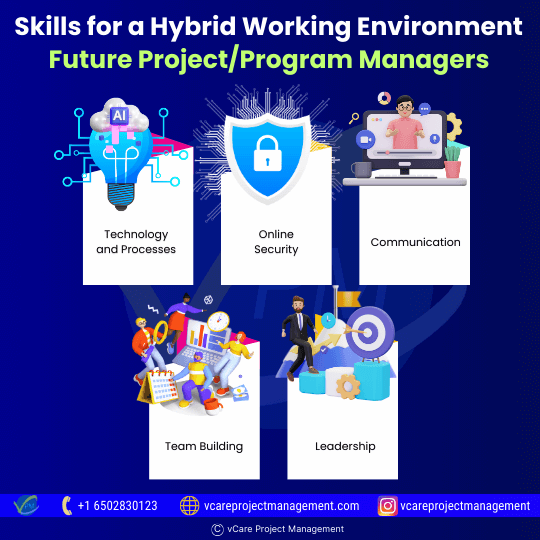
Skills for a Hybrid Working Environment
1. Technology and Processes
2. Online Security
3. Communication
4. Team-Building
5. Leadership
Every organization’s flexible work patterns look different. Additionally, there is no “one-size-fits-all” approach to implementing a hybrid work model. But, regardless of the circumstances, one thing is certain: training will be critical to your success.
Relevant information is critical. The right delivery methods are also important if you want them to stick. Finally, reaching and engaging your employees is critical to providing meaningful training. Use the best digital solutions to level the playing field for both in-office and remote employees. No matter where your employees are, the right approach will set them up for success.
Significance of Upskilling Project/Program Managers
Project/Program managers are valuable professionals who can work in various industries. It is frequently a highly sought-after position with numerous responsibilities. According to a study by PricewaterhouseCoopers, project management is critical to business performance and organizational success for 97% of organizations.
To ensure that a project management career takes off, one must have a mix of technical and soft skills. The top eight skills are listed below.
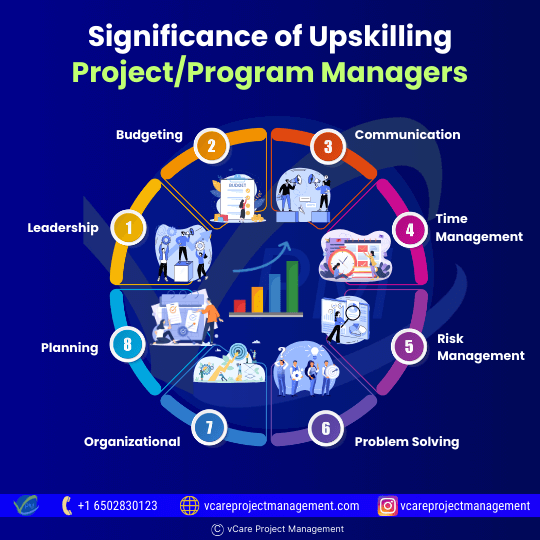
Significance of Upskilling Project/Program Managers
• Leadership
• Budgeting
• Communication
• Time Management
• Risk Management
• Problem Solving
• Organizational
• Planning
The world of project and program managers has changed significantly in the last few decades, with increased competition and the drive for efficiencies forcing companies to work differently. As project managers advance in their careers, they gain experience managing multiple related projects and making decisions that advance strategic and business objectives. As employers seek program managers to support the organization’s strategic goals, PgMP® credential holders will have a distinct advantage in employment and promotion opportunities over their peers.
How PgMP aids in gaining program managers’ knowledge
The Program Management Professional (PgMP®) certification is a visible indication of advanced experience and skill. As a result, it gives one distinct advantage in employment and promotion. As on 6th June 2024, there are 6,358 PgMP® that exist worldwide. The PgMP® is intended for professionals who have advanced in their careers and can manage multiple projects to ensure the success of a program. Furthermore, PgMP® holders are expected to manage complex tasks across multiple organizations, geographic locations, and cultures.
PgMP® Certification Benefits
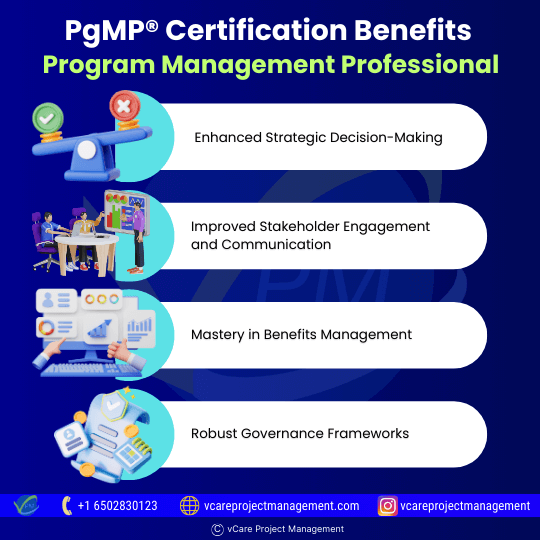
PgMP Certification Benefits
Enhanced Strategic Decision-Making:
The PgMP® certification equips program managers with the skills to make strategic decisions that align with organizational goals, ensuring the successful integration and delivery of multiple projects.
Improved Stakeholder Engagement and Communication:
Certified PgMPs are trained to effectively engage and communicate with stakeholders at all levels, fostering trust and ensuring stakeholder needs are met throughout the program lifecycle.
Mastery in Benefits Management:
Gain expertise in identifying, planning, and realizing program benefits, ensuring that the program delivers measurable value to the organization and its stakeholders.
Robust Governance Frameworks:
Learn to develop and implement robust governance frameworks that ensure program alignment with strategic objectives, risk management, and compliance with organizational standards.
Also, while preparing for PgMP® Certification, you will learn the best practices for conducting your programs more efficiently and achieving great results for your organization. This aspect might assist you in securing better pay and a higher position. In addition, you will be recognized as a certified program manager.
Final Thoughts
Program management will only be effective if the anticipated benefits are realized and effective leadership is at the top. Often, programs fail to achieve the organizational goal due to a lack of management skills in dealing with the program’s complexity and demand. Competence and skills are entirely different concepts, with skills acquired through training and competence referring to the level of proficiency in applying the acquired skills. The skills and competencies of a program manager and a project manager are similar. Still, those of a program manager are expected to be deeper and much more strategic in aligning a series of projects.
When program managers use their unique perspectives and insight to guide programs in the most strategically advantageous way, they can provide long-term value for the company’s vision and direction. Any organization that manages more than one project at a time will benefit from the assistance of a program manager.
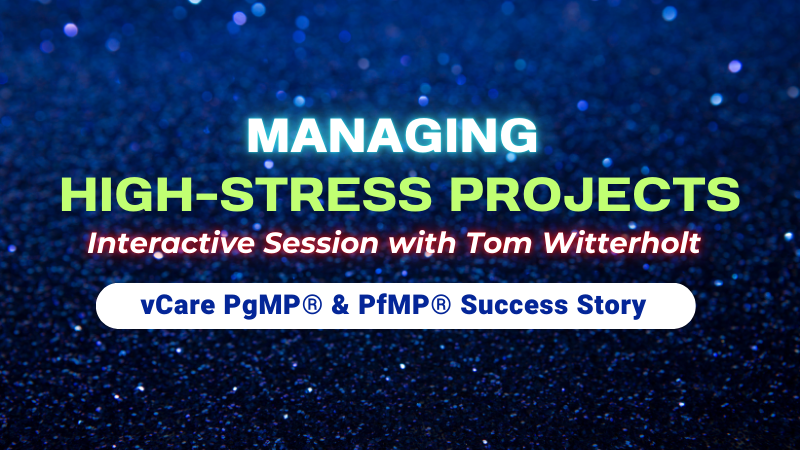



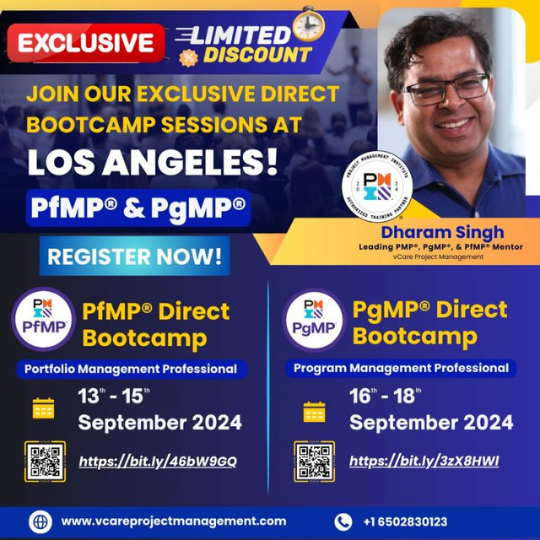
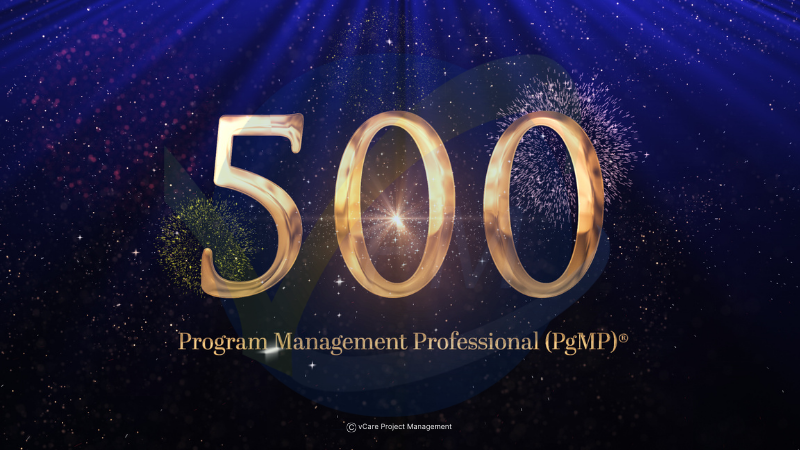

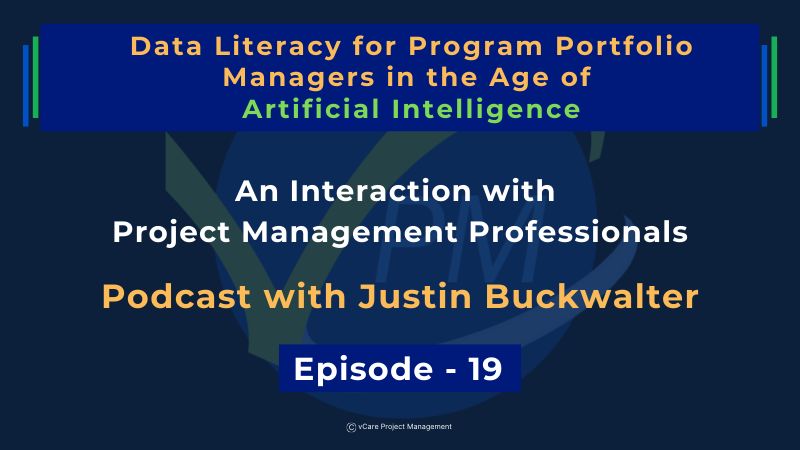







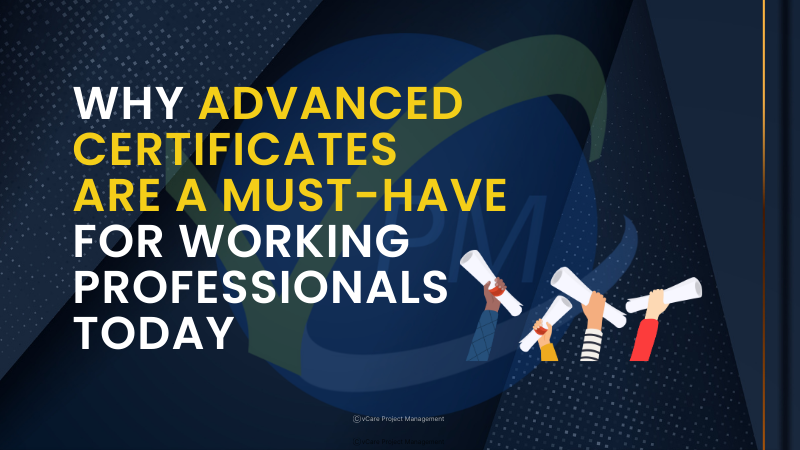
Celebrating 500+ PgMP Success Stories: Join the vCare Community and Elevate Your Program Management Career!
With immense pride, we at vCare Project Management celebrate guiding 500+ professionals from 55 countries to their PgMP® certification. This milestone speaks volumes about our dedication and the transformative journey we’ve shared. Thank you to everyone who’s been part of this incredible journey, driving success and elevating our collective mission.
Join the elite ranks of PgMP® certified professionals worldwide! With vCare Project Management, you’re not just enrolling in a course you’re embarking on a transformative journey toward excellence in program management. Benefit from our unparalleled dedication and expertise, as we guide you step-by-step towards achieving your PgMP® certification.